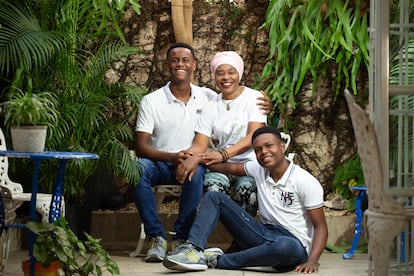Orphans of femicides in the Dominican Republic have no one to care for them
Research indicates that children who lose their mothers face abandonment, separation from siblings and revictimization at school

Just over ten years ago, Ezequiel Gómez brought a loaded gun to his wife Milquella Figuereo’s home and brutally murdered her. Despite her pleas, he showed no remorse and shot her in front of their two young children, aged 6 and 4. Figuereo died at the hospital at age 36. Gómez fled the scene and has evaded justice to this day. Kelvin Manuel and Júnior Alberto were suddenly orphans. While the dates, names and murder weapons may change, the number of children left motherless due to femicide remains alarmingly high. In the Dominican Republic, at least 64 boys and girls lost their mothers to gender-based violence last year. Over the past five years, 358 children lost their mothers, 70 in 2022 alone. “Violence against women is also violence against their children,” said Yanira Fondeur, president of the Life Without Violence Foundation, an organization that collects femicide data from press reports. The Attorney General’s website has only published data through 2022.
What set Kelvin and Júnior’s story apart from other orphans was Altagracia Valdez Cordero, Figuereo’s cousin and the adoptive mother of the boys, who are now 14 and 16 years old. At first, Valdez sent money every month to the children’s caregivers, their maternal grandparents. She never considered bringing them home to live with her, but daily conversations about their mother’s murder in the grandparents’ home was causing too much pain for the grieving children. “One day when I went to visit them, the youngest one just clung to my legs and gave me that look, like he was saying, ‘Please, don’t go,’” said Valdez, who lost her mother when she was seven due to a heart attack.
On that very night, Júnior moved into his new home. Several months later, Kelvin arrived, and Valdez began the process of obtaining guardianship and eventually finalizing the adoption. “Today, they’re just like any other teenagers, you know? Always glued to their screens, and you have to keep reminding them to study... but they’re still my adorable little boys. But it hasn’t been at all easy.”
It has been an uphill climb for everyone. The boys’ lives took a complete turn, and they both suffered recurring nightmares about the murder. Schoolmates shot them judgmental looks, and they had to adjust to new rules. It was the same for Valdez. “I’ve spent years as a therapist, specializing in child abuse and orphans as a result of femicide. But I’ve never actually had to raise children myself. Whenever I see mothers on the streets with their children, I just feel like praising them. Being a mother is such a tough job!” she laughs. It’s amazing how she can still laugh after seeing so much and comforting so many people in pain. “It was a really tough job for me. My whole life completely changed.”
But they were fortunate, says Valdez. Fortunate that she was able to adopt the brothers and provide them with psychological support. They are clearly an exception to the norm in the Dominican Republic. According to a qualitative study commissioned by the Life Without Violence Foundation, the reality for most children is a difficult journey back to “normalcy.” For the study, researcher Tahira Vargas García examined 17 femicide cases that took place in 2022 and left 45 children without mothers.
While Vargas acknowledges that each case is unique, there are some common characteristics. One of them is the lack of government support. Despite a government plan for psychological and financial assistance to children orphaned by femicide, the reality often falls short of what’s on paper. “Most of the cases I’ve encountered in my work have been plagued by bureaucracy,” said Valdez. “Everyone ends getting moved from one house to another, and their lives just keep getting more precarious.” Social worker Nilda Silverio, who works with orphaned minors, said she conducted 15 home visits in the first 24 days of January. “The hard part is the lack of financial resources that we’re dealing with. Sometimes, we have to dig into our own pockets to help families who have nothing to eat,” said Silverio. “There are resources out there, but maybe they’re ending up in the wrong hands.”
Foster homes often split up the children when large families are orphaned. “The trauma is already so intense, and then they have to go through it all alone,” said Vargas. “Often the victims would actually sense that something terrible was about to happen. They would talk to their children beforehand, asking them to look after their siblings in case the worst happened. The amount of pressure the kids must have felt is truly remarkable.” Valdez tried to encourage Kelvin and Júnior to socialize with their three other siblings (who have a different father), but her efforts were futile. “For those kids, Kelvin and Júnior are the product of their mother’s murderer. They judged them so much, even though they haven’t done anything wrong.”
Vargas’ research also found that schools are not always safe spaces for orphaned children and adolescents. “It’s really tough to see them revictimized at school where they’re singled out as children of murderers, or when their friends’ parents forbid them from playing together,” said Vargas. Although no studies directly correlate school dropouts with orphanhood caused by femicides in the Dominican Republic, Vargas says it happens frequently. “Sometimes, these children are punished and expelled for their behavior. However, all they truly need is psychological attention.” Fondeur said, “They need continuous support to deal with anger, frustration and heavy sadness. They are experiencing something intense and although the Ministry of Women has made some efforts in this regard, it’s not enough.”
Custody obstacles
In the Dominican Republic, when femicide is committed (which is not explicitly defined in the Penal Code), a court can suspend or terminate the parental custody of the murderer. However, this can only happen if a claim is filed by the child or the person responsible for their care. Unlike in Argentina, Peru, Spain and several Mexican states, Dominican courts do not automatically assume that someone who murders their spouse cannot be a good father. A legal process must be followed to assign custody, which involves time, money and dealing with bureaucracy.
“In cases of gender-based violence, judges often believe that they should prioritize maintaining the relationship between children and parents who are aggressors. This stems from the notion that spousal violence should not be conflated with the parent-child bond,” said Patricia Santana Nina, a lawyer specializing in gender and constitutional law. Women face many battles in the Dominican Republic and this is one of them, says Santana. “Preserving parental custody in femicide cases is part of the gender-based violence continuum.”
Sign up for our weekly newsletter to get more English-language news coverage from EL PAÍS USA Edition
Tu suscripción se está usando en otro dispositivo
¿Quieres añadir otro usuario a tu suscripción?
Si continúas leyendo en este dispositivo, no se podrá leer en el otro.
FlechaTu suscripción se está usando en otro dispositivo y solo puedes acceder a EL PAÍS desde un dispositivo a la vez.
Si quieres compartir tu cuenta, cambia tu suscripción a la modalidad Premium, así podrás añadir otro usuario. Cada uno accederá con su propia cuenta de email, lo que os permitirá personalizar vuestra experiencia en EL PAÍS.
¿Tienes una suscripción de empresa? Accede aquí para contratar más cuentas.
En el caso de no saber quién está usando tu cuenta, te recomendamos cambiar tu contraseña aquí.
Si decides continuar compartiendo tu cuenta, este mensaje se mostrará en tu dispositivo y en el de la otra persona que está usando tu cuenta de forma indefinida, afectando a tu experiencia de lectura. Puedes consultar aquí los términos y condiciones de la suscripción digital.









































